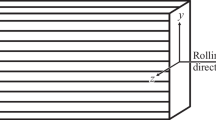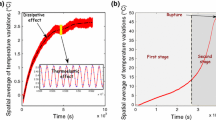Abstract
The applicability of a macroscopic time-temperature superposition principle (TTSP) to unidirectional composite strength is discussed based on the microscopic Simultaneous Fiber-Failure (SFF) model that has been presented by Koyanagi et al. (J. Compos. Mater. 43:1901–1914, 2009a). The SFF model estimates composite strengths as functions of fiber, matrix, and interface strengths. This paper first investigates the applicability of SFF to the complicated temperature dependence of composite strengths, i.e., one composite exhibits significant temperature dependence and another does not, considering the temperature dependence of the components, which results in successful estimations for the two composite systems used in the present study. The long-term durability predicted by the SFF and that predicted by the TTSP are then compared. They typically correspond to each other in various cases; accelerated testing methodology (ATM) employing TTSP is thus proved to be valid from the micromechanical viewpoint, assuming the SFF applicability.
Similar content being viewed by others
References
Curtin, W.: Theory of mechanical properties of ceramic-matrix composites. J. Am. Ceram. Soc. 74, 2837–2845 (1991)
Gatti, A., Mullin, J.V., Berry, J.M.: The role of bond strength in the fracture of advanced filament reinforced composites. ASTM Spec. Tech. Publ. 460, 573–582 (1969)
Goda, K.: The role of interfacial debonding in increasing the strength and reliability of unidirectional fibrous composites. Compos. Sci. Technol. 59, 1871–1879 (1999)
Guedes, R.: Durability of polymer matrix composites: viscoelastic effect on static and fatigue loading. Compos. Sci. Technol. 67, 2574–2583 (2007)
Guedes, R.: Relationship between lifetime under creep and constant stress rate for polymer matrix composites. Compos. Sci. Technol. 69, 1200–1205 (2009)
Ha, S.K., Jin, K.K., Huang, Y.: Micro-mechanics of failure (MMF) for continuous fiber reinforced composites. J. Compos. Mater. 42, 1873–1895 (2008)
Harlow, D., Phoenix, S.: The chain-of-bundles probability model for the strength of fibrous composites: I: Analysis and conjectures. J. Compos. Mater. 12, 195–214 (1978a)
Harlow, D., Phoenix, S.: The chain-of-bundles probability model for the strength of fibrous composites: II: A numerical study of convergence. J. Compos. Mater. 12, 314–334 (1978b)
Hongzhou, L., Yuxi, J., Gemi, M., Wei, J., Lijia, A.: Stress transfer and damage evolution simulations of fiber-reinforced polymer-matrix composites. Mater. Sci. Eng. A 425, 178–184 (2006)
Koyanagi, J.: Comparison of a viscoelastic frictional interface theory with a Kinetic Crack Growth theory in unidirectional composites. Compos. Sci. Technol. 69, 2158–2162 (2009)
Koyanagi, J., Ogihara, S.: Temperature dependence of glass fiber/epoxy interface normal strength examined by a cruciform specimen method. Compos. Part B 42, 1492–1496 (2011)
Koyanagi, J., Ogawa, F., Kawada, H., Hatta, H.: Time-dependent reduction of tensile strength caused by interfacial degradation under constant strain duration in UD-CFRP. J. Compos. Mater. 41, 3007–3026 (2007)
Koyanagi, J., Kotani, M., Hatta, H., Kawada, H.: A comprehensive model for determining tensile strengths of various unidirectional composites. J. Compos. Mater. 43, 1901–1914 (2009a)
Koyanagi, J., Shah, P.D., Kimura, S., Ha, S.K., Kawada, H.: Mixed-mode interfacial debonding simulation in single fiber composite under a transverse load. J. Solid Mech. Mater. Eng. 3, 796–806 (2009b)
Koyanagi, J., Yoneyama, S., Eri, K., Shah, P.D.: Time dependency of carbon/epoxy interface strength. Compos. Struct. 92, 150–154 (2010a)
Koyanagi, J., Yoneyama, S., Nemoto, A., Melo, J.: Time and temperature dependence of carbon/epoxy interface strength. Compos. Sci. Technol. 70, 1395–1400 (2010b)
Koyanagi, J., Yoshimura, A., Kawada, H., Aoki, Y.: A numerical simulation of time-dependent interface failure under shear and compressive loads in single-fiber composite. Appl. Compos. Mater. 17, 31–41 (2010c)
Landis, C., Beyerlein, I., McMeeking, R.: Micromechanical simulation of the failure of fiber reinforced composites. J. Mech. Phys. Solids 48, 621–648 (2000)
Miyano, Y., Nakada, M., Muki, R.: Applicability of fatigue life prediction method to polymer composites. Mech. Time-Depend. Mater. 3, 141–157 (1999)
Miyano, Y., Nakada, M., Sekine, N.: Accelerated testing for long-term durability of GFRP laminates for marine use. Compos. Part B 35, 497–502 (2004)
Miyano, Y., Nakada, M., Sekine, N.: Accelerated testing for long-term durability of FRP laminates for marine use. J. Compos. Mater. 39, 5–20 (2005)
Miyano, Y., Nakada, M., Cai, H.: Formulation of long-term creep and fatigue strengths of polymer composites based on accelerated testing methodology. J. Compos. Mater. 42, 1897–1919 (2008)
Nakada, M., Miyano, Y.: Verification of accelerated testing methodology for long-term CSR strength on three directions of unidirectional CFRP. In: Conference Proceeding in the US-Japan Conference on Composite Materials, 2008, Tokyo (2008)
Nakada, M., Miyano, Y.: Accelerated testing for long-term fatigue strength of various FRP laminates for marine use. Compos. Sci. Technol. 69, 805–813 (2009)
Okabe, T., Takeda, N., Kamoshida, Y., Shimizu, M., Curtin, W.A.: A 3D shear-lag model considering micro-damage and statistical strength prediction of unidirectional fiber-reinforced composites. Compos. Sci. Technol. 61, 1773–1787 (2001)
Okabe, T., Sekine, H., Ishii, K., Nishikawa, M., Takeda, N.: Numerical method for failure simulation of unidirectional fiber-reinforced composites with spring element model. Compos. Sci. Technol. 65, 921–933 (2005)
Raghavan, J., Meshii, M.: Prediction of creep rupture of unidirectional carbon fiber reinforced polymer composite. Mater. Sci. Eng. A 197, 237–249 (1995)
Raghavan, J., Meshii, M.: Creep rupture of polymer composites. Compos. Sci. Technol. 57, 375–388 (1997)
Rosen, B.: Tensile failure of fibrous composites. AIAA J. 2, 1982–1991 (1964)
Subramanian, S., Reifsnider, K.L., Stinchcomb, W.W.: Tensile strength of unidirectional composites: the role of efficiency and strength of fiber-matrix interface. J. Compos. Technol. Res. 17, 289–300 (1995)
Watanabe, N., Koga, R., Nakada, M., Miyano, Y., Muki, R.: Time-temperature dependent tensile behavior of unidirectional CFRP. In: Conference Proceeding in 14th International Conference on Composite Materials, San Diego (2003)
Author information
Authors and Affiliations
Corresponding author
Rights and permissions
About this article
Cite this article
Koyanagi, J., Nakada, M. & Miyano, Y. Tensile strength at elevated temperature and its applicability as an accelerated testing methodology for unidirectional composites. Mech Time-Depend Mater 16, 19–30 (2012). https://doi.org/10.1007/s11043-011-9160-y
Received:
Accepted:
Published:
Issue Date:
DOI: https://doi.org/10.1007/s11043-011-9160-y




